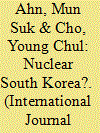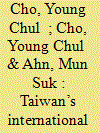| Srl | Item |
| 1 |
ID:
129547


|
|
|
|
|
| Publication |
2014.
|
| Summary/Abstract |
After North Korea's third nuclear test in February 2013, South Koreans are once again debating whether to go nuclear. Some advocates of South Korean nuclear possession argue that nuclear weapons are necessary for self-defence against the nuclear-armed North. Some support South Korea's nuclearization as leverage vis-à-vis North Korea and China. Some argue that going nuclear will heighten the South's national prestige. However, others counter that South Korea's nuclearization is not desirable and, indeed, barely feasible. First, since North-South conflicts have not diminished since the 1953 truce, the nuclear armament of the two Koreas could result in a nuclear war. Second, the South's nuclearization would only hasten North Korea's ardent pursuit of securing and increasing its stock of nuclear warheads. Third, it would prompt a fierce arms race in Northeast Asia by pressing Japan and Taiwan to go nuclear. Finally, it would undermine Seoul's close ties with Washington. In order to maintain a nuclear-free South Korea, the US needs to reinforce its nuclear umbrella and eradicate the North Korean nuclear threat through active and comprehensive negotiations with Pyongyang.
|
|
|
|
|
|
|
|
|
|
|
|
|
|
|
|
| 2 |
ID:
173220


|
|
|
|
|
| Summary/Abstract |
The Kim Jong Un regime recently shifted from an emphasis on military power to an ‘economy first’ policy. The shift was driven by a pragmatic calculation, on the part of the North Korean leader, recognizing that the stability of the regime depends on economic development. Kim hopes that a shift from nuclear confrontation to diplomacy will result in the lifting of Western sanctions. It is important that the United States interprets Kim’s intentions correctly, and tries to strike a deal with North Korea.
|
|
|
|
|
|
|
|
|
|
|
|
|
|
|
|
| 3 |
ID:
152499


|
|
|
|
|
| Summary/Abstract |
This paper provides a critical check to the ongoing, dominant blue/green debate about Taiwan’s identity vis-à-vis China. The colour blue is associated with those who support closer ties with China and green with those who support Taiwanese independence. The state-centric debate over unification, independence, or the status quo in cross-strait relations is closely tied to Taiwan’s national aspirations to enhance its international standing in the twenty-first century, a standing which is arguably diplomatically under-recognized. Based on a critical discussion of the blue/green debate, this paper presents two pragmatic ways of augmenting Taiwan’s international visibility through global recognition without jeopardizing national security or regional stability in East Asia.
|
|
|
|
|
|
|
|
|
|
|
|
|
|
|
|
| 4 |
ID:
109075


|
|
|
|
|
| Publication |
2011.
|
| Summary/Abstract |
It is important to identify the real intention of North Korea's nuclear program in order to predict the nation's future nuclear posture and more effectively engage in nuclear talks and negotiations with its government. Nuclear proliferation cases have mainly been explained using three theoretical frameworks: the security model, the domestic politics model, and the symbol/norms model. However, these models have serious shortcomings in explaining the root cause of North Korea's nuclear program. This article examines North Korea's political and economic situation during the critical periods of the first and second North Korean nuclear crises and argues that the nation's nuclear program can be explained using the regime survival model.
|
|
|
|
|
|
|
|
|
|
|
|
|
|
|
|